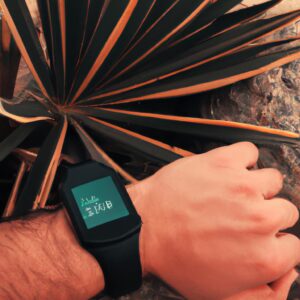Take Fitness Tracking to the Next Level: A Comparison Guide

Introduction & Review of “Best Fitness Trackers for Health Enthusiasts: A Comparison”
Are you a health enthusiast looking for the best fitness tracker to help you reach your goals? With the wide selection of advanced technologies available on the market, it can be hard to choose the right one. That’s why we’ve put together this guide to help you compare the best fitness trackers for health enthusiasts.
It’s important to note that all fitness trackers come with different features and capabilities. We’ll take a look at some of the most popular models on the market such as the FitBit, Apple Watch, and Garmin. We’ll also review the pros and cons of each model and make sure to point out any particular highlights or drawbacks.
We’ll then follow up with a comparison of the fitness tracking capabilities across models, discuss the health monitoring abilities, sync capabilities with smartphones, and battery life and waterproofing options. Lastly, we’ll provide a total summary of the pros and cons of each model and a final recommendation.
Let’s dive in and explore the top contenders for best fitness trackers for health enthusiasts!
Comparative Overview of the Best Fitness Trackers
Fitness trackers are an essential tool for health enthusiasts. They help to measure and monitor your physical activity, from calories burnt, steps taken and sleep patterns. The most popular fitness trackers are manufactured by FitBit, Apple and Garmin. Each of these companies have their own range of models, ranging from simple and affordable to advanced and expensive. In this section, we will provide a comparative overview of the best fitness trackers from each of these brands and discuss the key features and functions of each model.
- FitBit: A leading manufacturer of fitness trackers with a variety of models to suit all budgets and activity levels.
- AppleWatch: Another well-known brand with a range of smartwatch models, the more advanced ones offering advanced features such as heart rate monitoring.
- Garmin: A trusted name in the world of fitness trackers, Garmin offer a selection of models that are comfortable and easy to use.
Each of these manufacturers feature their own unique designs and styles, so it can be difficult to make a decision on which model is best for you. However, all of the models are designed to accurately measure and monitor your physical activity, providing you with the information you need to reach your fitness goals. Let’s now take a closer look at each of the models, discussing the features and benefits of each.
In Depth Review of Top Contenders: FitBit, AppleWatch & Garmin
When it comes to fitness tracking technology, it can be hard to know where to start. There are multiple device models on the market, each offering its own unique set of features and benefits. In this guide, we’ll be taking a deep dive into three of the top fitness trackers on the market: FitBit, AppleWatch, and Garmin.
The FitBit is a highly popular model among fitness enthusiasts. It offers users a range of features, including tracking of steps, heart rate, and sleep patterns. It also has several other features, such as reminders for activity goals, calorie goals, and water intake. The app allows you to track your progress over time, helping you stay motivated and focused on your goals.
The AppleWatch offers many of the same fitness tracking features as the FitBit, such as steps taken, calories burned, and sleep patterns. It also includes an added element of social connectedness, allowing you to track the progress of friends and family who are also using the device. The Watch also allows you to access music for listening while you work out, along with additional apps to get the most out of your exercise.
The Garmin is a well-known device designed specifically for active outdoor enthusiasts. It is equipped with GPS tracking capabilities, perfect for anyone who needs to know their exact location during their outdoor activities. It also comes with a variety of features designed specifically for those who run, cycle or swim, such as a built-in heart rate monitor, personalized running dynamics, and interval training.
Each of these fitness trackers offers a unique selection of features that can cater to different lifestyles and needs. Read on to find out what each model has to offer, and which one may be the best choice for you.
Benefits & Drawbacks of Each Model
When it comes to the benefits and drawbacks of fitness trackers, choosing the right one requires careful consideration. There are three major models on the market today: Fitbit, Apple Watch, and Garmin. Each model offers its own unique benefits and drawbacks.
Fitbit
The Fitbit fitness tracker is generally lauded for its accuracy and comfort. It also has long battery life, making it a reliable companion for tracking performance over long periods. The downside of the Fitbit’s design is that it doesn’t have many features beyond tracking physical performance.
Apple Watch
The Apple watch is known for its sleek design and comprehensive health tracking abilities. It offers a range of metrics, such as steps taken, calories burned, sleep patterns, and heart rate. It also has access to more apps than the Fitbit, allowing the user to customize their experience. However, the Apple watch’s battery life is quite short and it is not as accurate as a Fitbit when tracking performance.
Garmin
The Garmin fitness tracker is renowned for its accuracy and durability. It is able to track performance over long periods without losing its accuracy. It also has a wide range of features that make it suitable for activities such as swimming and running. The only downside is the lack of customization options, as most metrics come pre-set with the device.
Specific Specs & Features of the FitBit, AppleWatch & Garmin
When it comes to fitness trackers, there are a number of specifications and features that can play an important role in determining which one is the best choice for a particular consumer. The following section will explore the specific specs and features of the top contenders, including the FitBit, Apple Watch, and Garmin.
FitBit
- The FitBit offers an efficient accelerometer and altimeter, allowing users to measure their physical activity intensity and progress.
- It provides continuous heart rate monitoring and real-time alerts for optimal exercise performance.
- It also tracks sleep stages, as well as steps taken and calories burned.
- It connects with a range of other devices via Bluetooth.
- It comes with a companion app that allows users to manage their workouts & see their progress over time.
Apple Watch
- The Apple Watch has an advanced heart rate monitor and accelerometer.
- It tracks workouts, steps, and calories burned.
- It also monitors sleep stages and water intake.
- It syncs with compatible Apple apps, including a companion workout app.
- It has a waterproof rating of 5 ATM.
Garmin
- The Garmin fitness tracker has an optical heart rate monitor and accelerometer.
- It tracks steps, distance, and calories burned from a variety of activities.
- It can track exercise intensity and monitor sleep.
- It supports auto pause, run/walk, and pacing modes.
- It is compatible with a range of other devices and activities.
Fitness Tracking Comparison for Each Model
When it comes to tracking your fitness activities, each model of fitness trackers offers different features and capabilities. Let’s compare the three models in detail.
FitBit
FitBit is the industry leader when it comes to fitness tracking. It offers a variety of features and functions that other models can’t quite compete with. The FitBit can track your steps, calories, distance, heart rate, and sleep. It also has a built-in timer and alarm, so you can stay on top of your fitness goals. Additionally, the FitBit is compatible with most smartphones, allowing you to sync your activity data directly to your device.
AppleWatch
The AppleWatch is a great all-in-one solution for tracking fitness. It has the same tracking capabilities as the FitBit, plus its own unique set of features. It has an integrated GPS system to track outdoor runs or hikes, as well as a range of health tracking apps. The AppleWatch also allows you to store music directly on the watch, so you can listen to your favorite tunes while working out.
Garmin
Garmin is another popular fitness tracking device. It has many of the same features as the FitBit and AppleWatch, but its standout feature is its support for interval training. This means you can create custom workouts that are tailored to your specific goals. Garmin also offers a range of waterproof models, so you don’t have to worry about taking your tracker out in the rain.
Overall, each model offers its own unique set of features and capabilities. Depending on your individual needs, any one of these fitness trackers could be the perfect fit.
Health Monitoring & Smartphone Sync Capabilities
When it comes to health tracking, fitness trackers have come a long way. Nowadays, there are a number of devices available that offer a wide range of features to help you stay healthy and fit.
One such feature is the ability to monitor your health and keep track of your progress. Depending on the specific model, this may include things like monitoring your calorie intake, taking your heart rate, tracking your sleep pattern, and more.
Most of the time, this data can be automatically synchronized with your smartphone, providing you with easy access to your detailed health information. By having the data at your fingertips, you can easily make informed decisions about your lifestyle choices and adjust your goals accordingly.
Furthermore, many fitness trackers also come with dedicated apps, allowing you to customize your settings and access more detailed data. With these apps, you can view real-time feedback on your progress, receive personalized notifications, and even compare your results with other people in the same activity.
Whether you’re an occasional jogger or an avid runner, having comprehensive health monitoring capabilities allows you to make sure that your physical activity is as safe as possible. It also makes it easier to keep track of your progress and stay motivated to maintain your goals.
Battery Life & Waterproofing Capabilities
When shopping for a fitness tracker, battery life and waterproofing capabilities should be one of the top considerations. When it comes to battery life, you want to make sure that the device can last through your workouts without needing to be recharged. Most fitness trackers offer several days of battery life on a single charge. However, there are some which offer even more longevity, such as FitBit Charge 4, Apple Watch Series 6 and Garmin Forerunner 245 Music. These models offer between 5-7 days of battery on a single charge, depending on the type of tracking and features enabled.
When it comes to waterproofing capabilities, all three devices are waterproof up to 50 meters, making it suitable for swimming and other water activities. However, if you are looking for an activity tracker specifically for swimming, then the Garmin Forerunner 245 Music is the best choice. It offers detailed analysis of laps and stroke type, and stores swim data for up to two years.
In summary, when deciding between these three fitness trackers, you should consider the battery life, waterproofing capabilities, and additional features for swimmers.
Performance & Durability Tradeoffs
When considering the best fitness tracker for health enthusiasts, performance and durability are both important considerations. Performance refers to how accurately the device can track data such as steps taken, calories burned, heart rate, etc. whereas durability refers to the longevity of the device’s battery life and its waterproofing capabilities.
The Fitbit series of trackers is known for its accuracy and reliability. Its users can trust that the data collected will be accurate and they also benefit from its long-lasting battery life – up to 7 days in one charge – as well as its water-resistant capabilities. The Apple Watch series, on the other hand, offers superior tracking accuracy but is less durable than the Fitbit with a maximum battery life of 18 hours and is not as water-resistant.
Finally, the Garmin range of trackers is known for its ruggedness and water resistance thanks to its robust components, yet the trade-off here is its longer battery life that needs recharging every 5-7 days. All three models have their own set of pros and cons, so it’s important to first consider your individual needs and preferences before making a purchase.
Summary of Pros & Cons Across Models
With so many different models of fitness trackers on the market, it can be hard to decide which one is right for you. To make things easier, let’s review the pros and cons of each model.
FitBit Pros:
- The FitBit Versa 2 offers a large range of features at a competitive price.
- It comes with a built-in heart rate monitor and sleep tracking.
- It has an easy to read display and can quickly sync with your phone.
FitBit Cons:
- The battery life could be better with only 4 days of use between charges.
- It does not have GPS capabilities, meaning it requires a connection to your phone for outdoor activities.
AppleWatch Pros:
- The AppleWatch Series 5 has a longer battery life of up to 18 hours.
- It has built-in GPS capabilities for tracking outdoor activities.
- It is compatible with Apple’s Health app, allowing you to track your health and fitness data.
AppleWatch Cons:
- It is more expensive than the FitBit and some other models on the market.
- It is limited to Apple devices, making it incompatible with Android phones.
Garmin Pros:
- The Garmin Vivomove 3 offers a sleek design and extended battery life.
- It is waterproof and offers improved health and fitness tracking.
- It is equipped with both GPS and GLONASS satellite systems.
Garmin Cons:
- It can be expensive compared to other models on the market.
- The design may not appeal to everyone and it lacks some features available on other trackers.
By taking into account each model’s strengths and weaknesses, you can make an informed decision about which fitness tracker is right for you.
Total Final Recommendation
With all the individual features and specs weighed in, it’s time to make the final decision of which fitness tracker to buy. FitBit is an excellent choice for those looking for a comprehensive tracking experience but don’t want to pay top-of-the-line prices. The AppleWatch is a great choice for those who prefer a bit of style and want a few extra features like heart rate monitoring or smartwatch capabilities. Last but not least, the Garmin comes with advanced tracking technology and offers a wealth of features and performance that will suit any health enthusiast.
Each model has its unique benefits and drawbacks, so it is important to take into account your own personal needs and style when making the final decision. You may choose to go with a more affordable model such as the FitBit, or invest in a high-end model such as the Garmin. Regardless, the best fitness tracker for you should be the one that fits your lifestyle, budget, and preferences.
Conclusion of the Guide & Resources
In conclusion, this guide has provided an in-depth review and comparison of the best fitness trackers for health enthusiasts. From FitBit to Apple Watch to Garmin, readers can now make an informed decision as to which fitness tracker is the best for their needs and lifestyle. Each of these models offers a unique set of benefits and drawbacks, allowing readers to find the right tracker to meet any budget or activity level.
For additional information, readers are encouraged to visit the various company websites where they can explore specifications, features, health monitoring capabilities, smartphone syncing, battery life, and much more. Other online resources, such as consumer reviews and ratings, may also prove useful in one’s research.
We hope this guide was helpful in selecting the best fitness tracker for your health enthusiast needs.
comments: 0






